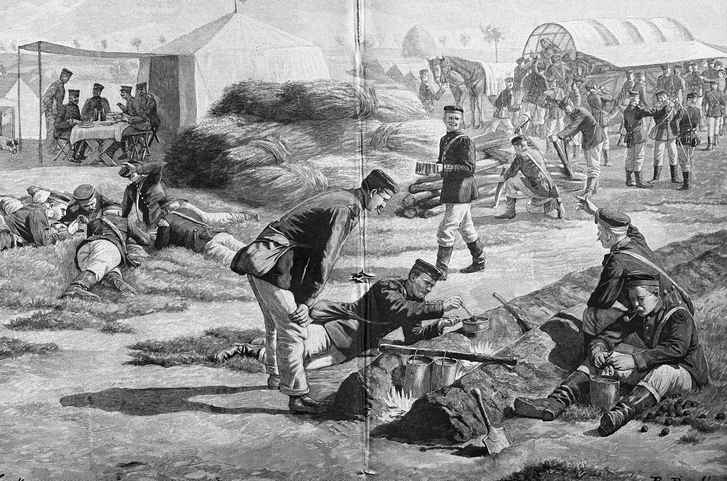This month, we talk about Colonel William King, the man behind the name of Fort King. King started his military career as a 2nd Lieutenant in the US Army back in 1808. He fought in the War of 1812 and earned a promotion to Lieutenant Colonel in 1814 thanks to his bravery in numerous battles. Among them, the legendary Battle of Horseshoe Bend in Alabama, where King and his men played a crucial role. In 1818, he was handpicked by General Andrew Jackson to lead the 4th Infantry during the infamous and controversial First Seminole War.
Why was the First Seminole War Controversial?
Monroe’s Deniability
Monroe’s reaction to the news of Jackson’s attack was expressed in a letter written to James Madison on July 1, 1818. This happened on the same day he was informed of the invasion. It read, in part:
“General Jackson’s report is received in consequence of which I shall return to Washington on Monday next, the 13th – He imputes the whole Seminole War to the interference and excitement by the Spanish authorities in the Floridas, of the Indians, together with that of the foreign adventurers imposing themselves on those people for the agents of foreign powers. I have no doubt that his opinion is correct, though, he has not made his case as strong as I am satisfied he might have done. There are serious difficulties in the business, on which ever side we view it. The motive for pressing Spain in the present state of affairs, having the Mississippi, Florida, etc., founded on the interest of the country, is not urgent, but the sense of injury from her and of insult, together with the desire of aiding the Colonies by pressing her strong.”
In March 1818, General Andrew Jackson initiated a mission to “seize Florida” with an army of 800 regulars and 900 Georgia militia. Jackson wrote to President Monroe, seeking permission to invade the Spanish colony, which he claimed to have received. However, some historians argue that the president purposely created deniability, while secretly supporting Jackson’s actions.
During the mission, Jackson captured two British subjects, Alexander Arbuthnot and Robert Ambrister, who were tried as outlaws for making war on the United States. A court-martial found them guilty, sentencing Ambrister to a whipping and prison, and Arbuthnot to hanging. The next day, General Jackson reviewed the sentences and decided Ambrister’s punishment was too light, ordering him to be shot. The executions triggered a parliamentary inquiry, as there was no real evidence against Arbuthnot on any charge that would stand in an ordinary court.
After this, Jackson was accused of being a tyrant and a murderer by European newspapers. But Jackson was undeterred and continued his mission, leading 1,200 men to capture Pensacola, despite protests from the Spanish governor. After a brief battle, Jackson established a military government in Florida, claiming it was necessary for self-defense as Spanish authority could not be maintained.
Jackson’s actions sparked a public outcry, and even Congress considered censuring him but failed to act. Nevertheless, Jackson’s popularity soared, and he was eventually elected as president of the United States in 1828. Despite the controversy surrounding his campaign in Florida, Jackson became a symbol of American strength and resilience, and his legacy continues to be debated today.
Appointment to Military Governor
After Governor José Masot’s surrender to General Jackson on May 23, Jackson appointed Colonel William King as the military governor of West Florida. The appointment happened just three days later, which was due to Jackson interpreting Masot’s terms of surrender as giving the United States control over the entire region.
King served as governor until he was replaced by Edmund P. Gaines, following orders from U.S. Secretary of War John C. Calhoun.
The final Spanish governor of West Florida, José María Callava, succeeded King, marking the end of a tumultuous period in Florida’s history. These events serve as a reminder of the complex and often messy nature of diplomacy and territorial expansion.
An Unfavorable Legacy

Colonel William King found himself court-martialed on five charges, including the violation of public funds and neglect of duty. The most serious charge against him was for encouraging the infliction of corporeal punishment on his men, through the issuance of an order that required them to receive fifty lashes and be confined in the black hole for a month if found out of their quarters between tattoo and reveille.
Despite pleading “Not Guilty” to the charges, Colonel King was found guilty on three of them, including the most severe charge of neglect of duty. The court sentenced him to a five-year suspension from all rank, pay, and emoluments. This marked a significant setback for the once-decorated Colonel, whose reputation had been tarnished by the trial.
On December 19, 1825, the Senate ordered a printing of a document that complained that the rank of colonel in the Army was unjustly withheld from William King and requested that it be restored to him. You can read that document today.
The Naming of the Fort
Despite the court martial and having been found guilty on three of the charges against him, Colonel William King continued to have the support of Andrew Jackson. He was honorably discharged from the Army in 1821. Five years later, he died in Mobile Alabama. In 1827, Fort King was built and named in his honor.


